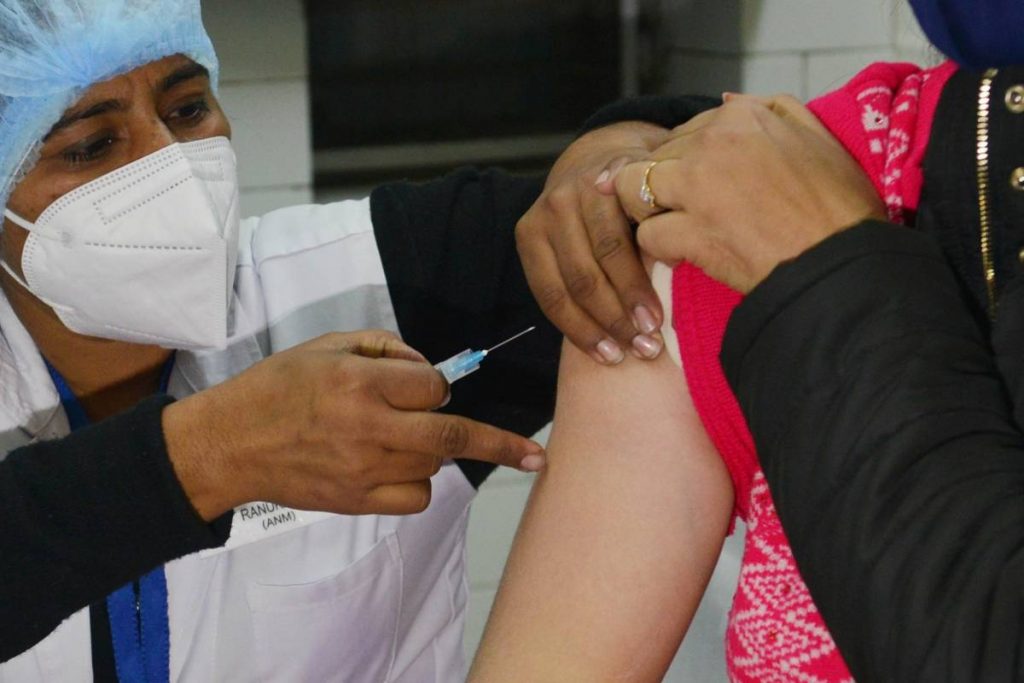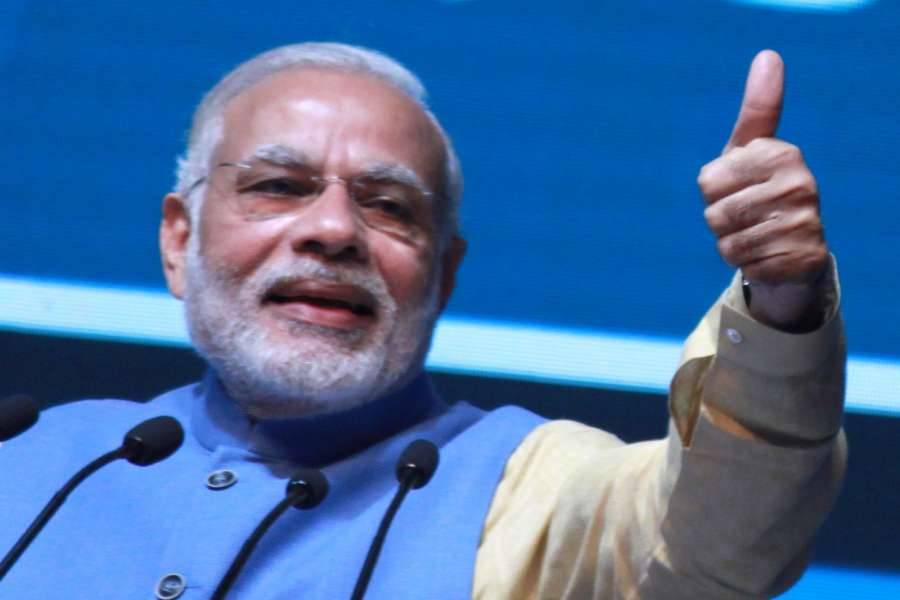
India began the world’s largest Covid-19 vaccination programme on Saturday with Prime Minister Narendra Modi launching the drive aimed at ending the pandemic which so far has killed 1,52,093 people in the country and ravaged the economy.
Addressing the country digitally, the Prime Minister said that India managed to make two ‘Made-in-India’ vaccines in a very short period which usually takes years.
Lauding the efforts of scientists who are involved in vaccine research, Modi said they deserve special praise for making these vaccines and that “the vaccines will provide us a decisive victory against the deadly pandemic”.
The Drug Controller General of India earlier this month approved ‘Covishield’ and ‘Covaxin’ vaccines for emergency use. The Oxford University and AstraZeneca have developed ‘Covishield’, which has been manufactured in India by Serum Institute of India in Pune while Bharat Biotech has developed ‘Covaxin’.
The Prime Minister further reminded people to get two doses of the vaccine, explaining that “there should be a gap of almost one month between the first and second doses”.
“Only two weeks after the second dose, your body will develop the necessary strength against coronavirus,” the Prime Minister said.
Noting that this kind of vaccination campaign on such a large scale has never been done in history, Modi said “India is vaccinating three crore people in its first phase of vaccination starting today and the government will bear the cost of the vaccination to be administered to healthcare workers”.
In the second phase, the Prime Minister said “we have to take it to 30 crore”.
“Those who are elderly, who are suffering from serious illness, will get vaccinated at this stage. You can imagine, there are only three countries in the world with a population above 300 million – India, China and US itself.”
The Prime Minister launched the vaccination drive at a time when India registered 1,05,42,841 Covid infections till Saturday with 15,158 new cases in the last 24 hours, as it continued with its streak of low single-day cases. A total of 1,01,79,715 people have recovered from the disease and currently there are 2,11,033 active cases. The recovery rate stands at 96.56 per cent, while the fatality rate is 1.44 per cent.

In Delhi, which has 81 vaccination sites, Bharat Biotech’s Covaxin has been allotted to six Centre-run hospitals including, while 75 Delhi government and private hospitals will receive Covishield, developed by Oxford-AstraZeneca with Serum Institute of India.
The vaccine will be first offered to the healthcare workers, frontline workers and those above 50 years of age, followed by the below 50 population with comorbidities, and finally to the remaining population based on disease epidemiology and vaccine availability.
The vaccination drive has been planned in a phased manner, identifying the priority groups. Healthcare workers, both in government and private sectors, including Integrated Child Development Services (ICDS) workers, will receive the vaccine in the first phase.
Earlier on Friday, Union Health Minister Harsh Vardhan said that India’s exercise to vaccinate its population against Covid-19 will be the largest immunisation drive in the world. The minister reiterated that both the indigenously manufactured vaccines have proven to be safe.
The Covid-19 Vaccine Intelligence Network (Co-WIN) system, a digital platform, will be used to track the enlisted beneficiaries on a real-time basis. Prime Minister Modi will launch the app today.
The platform enables national and state administrators to view and sort the data of the beneficiaries as per their gender, age and comorbidity. They can also view the metadata of vaccination and the Adverse Event Following Immunisation (AEFI) reported from the constituent districts.
At the vaccination site, only pre-registered beneficiaries will be vaccinated as per prioritisation, and there will be no provision for on-the-spot registrations. A dedicated 24×7 hotline – 1075 – has also been set up to address questions related to the vaccine rollout and the Co-WIN app.
The entire vaccination process will be broadly similar to the election process. Each vaccination team will consist of five members, including security personnel, nurses, paramedics and a doctor. Three will be a waiting area, an inoculation room and a post-vaccination observation area. There will also be a reception desk for registration and verification of the beneficiaries.

Notably, only those above 18 years will be vaccinated. Pregnant women or who are not sure of their pregnancy and lactating mothers should not take the vaccine. Those with a history of bleeding or coagulation disorder will be administered the vaccine with utmost caution.
Vaccination will have to be deferred for four to eight weeks after recovery of patients with active Covid symptoms, or those who have been given plasma therapy, and those who are unwell or have been hospitalised for any other reason.
The second dose of the Covid vaccine will be administered after an interval of fourteen days. Also, interchanging Covid-19 vaccines is not allowed.
The mild adverse impacts of the Covishield vaccine could be headache, fatigue, pain in muscle, injection site tenderness, weakness, pyrexia, chills, arthralgia and nausea.
Prime Minister Narendra Modi will virtually launch the world’s largest vaccination programme at 10:30 a.m. and almost three lakh beneficiaries, belonging to the priority groups, will be administered the silver bullet at over 3,006 vaccination sites across the country. Around 100 beneficiaries will be vaccinated at each session site.
Two vaccines — Oxford Covid vaccine Covishield manufactured by the Serum Institute of India, and indigenously developed Covaxin by the Bharat Biotech — will be administered to priority groups. So far, the Central government has procured 1.1 crore Covishield and 55 lakh Covaxin vaccines at a cost of Rs 200 and Rs 206 per dose, respectively.
In Delhi, which has 81 vaccination sites, Bharat Biotech’s Covaxin has been allotted to six Centre-run hospitals including, while 75 Delhi government and private hospitals will receive Covishield, developed by Oxford-AstraZeneca with Serum Institute of India.
The vaccine will be first offered to the healthcare workers, frontline workers and those above 50 years of age, followed by the below 50 population with comorbidities, and finally to the remaining population based on disease epidemiology and vaccine availability.
The vaccination drive has been planned in a phased manner, identifying the priority groups. Healthcare workers, both in government and private sectors, including Integrated Child Development Services (ICDS) workers, will receive the vaccine in the first phase.
Earlier on Friday, Union Health Minister Harsh Vardhan said that India’s exercise to vaccinate its population against Covid-19 will be the largest immunisation drive in the world. The minister reiterated that both the indigenously manufactured vaccines have proven to be safe.
The Covid-19 Vaccine Intelligence Network (Co-WIN) system, a digital platform, will be used to track the enlisted beneficiaries on a real-time basis. Prime Minister Modi will launch the app today.
The platform enables national and state administrators to view and sort the data of the beneficiaries as per their gender, age and comorbidity. They can also view the metadata of vaccination and the Adverse Event Following Immunisation (AEFI) reported from the constituent districts.
At the vaccination site, only pre-registered beneficiaries will be vaccinated as per prioritisation, and there will be no provision for on-the-spot registrations. A dedicated 24×7 hotline – 1075 – has also been set up to address questions related to the vaccine rollout and the Co-WIN app.
The entire vaccination process will be broadly similar to the election process. Each vaccination team will consist of five members, including security personnel, nurses, paramedics and a doctor. Three will be a waiting area, an inoculation room and a post-vaccination observation area. There will also be a reception desk for registration and verification of the beneficiaries.
Notably, only those above 18 years will be vaccinated. Pregnant women or who are not sure of their pregnancy and lactating mothers should not take the vaccine. Those with a history of bleeding or coagulation disorder will be administered the vaccine with utmost caution.
Vaccination will have to be deferred for four to eight weeks after recovery of patients with active Covid symptoms, or those who have been given plasma therapy, and those who are unwell or have been hospitalised for any other reason.
The second dose of the Covid vaccine will be administered after an interval of fourteen days. Also, interchanging Covid-19 vaccines is not allowed.
The mild adverse impacts of the Covishield vaccine could be headache, fatigue, pain in muscle, injection site tenderness, weakness, pyrexia, chills, arthralgia and nausea.

Leave a Reply